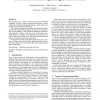ERLANG
2006
ACM
13 years 10 months ago
2006
ACM
A concurrent cache design is presented which allows cached data to be spread across a cluster of computers. The implementation s persistent storage from cache storage and abstract...
ERLANG
2006
ACM
13 years 10 months ago
2006
ACM
This paper describes the lessons learnt when internally developing web applications in Erlang. On the basis of these experiences, a framework called the Web Platform has been impl...
ERLANG
2006
ACM
13 years 10 months ago
2006
ACM
We present a case study in which a novel testing tool, Quviq QuickCheck, is used to test an industrial implementation of the Megaco protocol. We considered positive and negative t...
ERLANG
2006
ACM
13 years 10 months ago
2006
ACM
Termite Scheme is a variant of Scheme intended for distributed computing. It offers a simple and powerful concurrency model, inspired by the Erlang programming language, which is ...
ERLANG
2006
ACM
13 years 10 months ago
2006
ACM
This article introduces Dryverl, an Erlang/C binding code r. Dryverl aims at becoming the most abstract, open and efficient tool for implementing any Erlang/C bindings, as either...
ERLANG
2006
ACM
13 years 10 months ago
2006
ACM
We present the new model checker McErlang for verifying Erlang programs. In comparison with the etomcrl tool set, McErlang differs mainly in that it is implemented in Erlang. The ...
ERLANG
2006
ACM
13 years 10 months ago
2006
ACM
Erlang/OTP's DBMS Mnesia is lacking in several important areas to consider when implementing very large databases with massive scalability requirements. This article reveals ...




